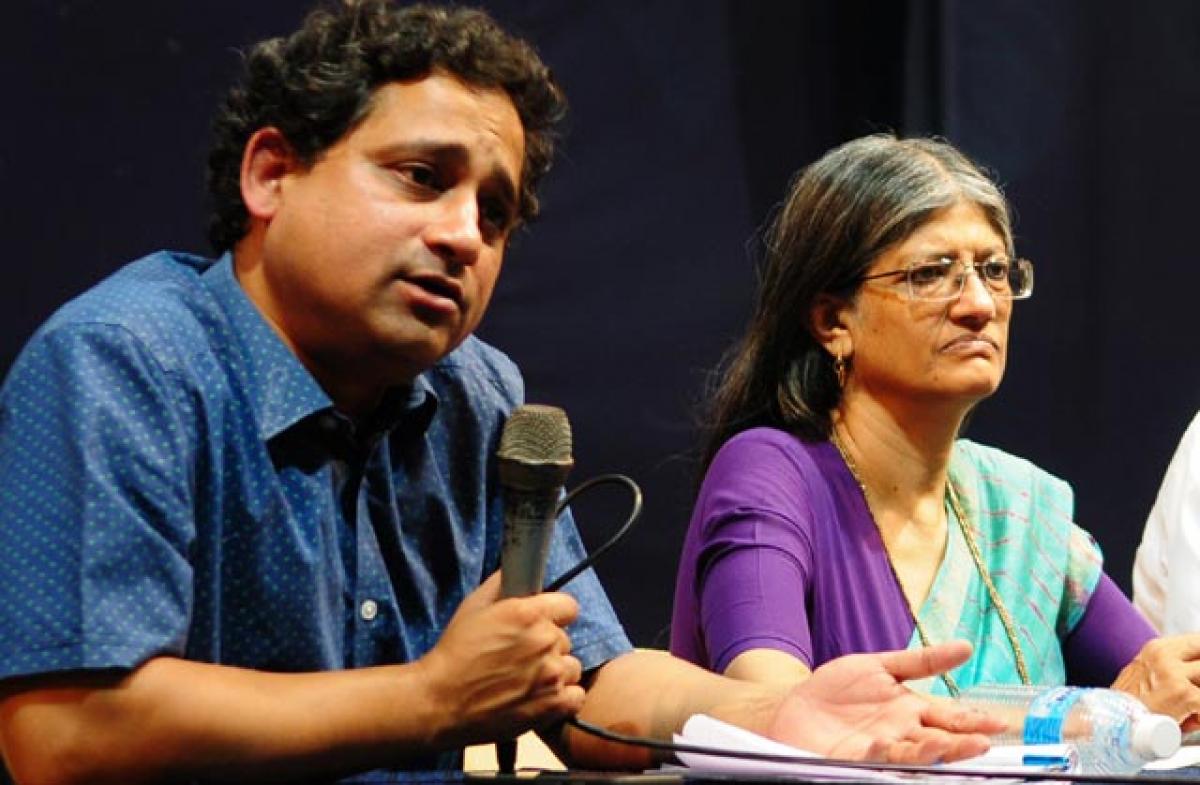Live
- Hyd echoes with chants of ‘Jai Shri Ram’, ‘Jai Hanuman’
- Summer holidays for schools from today
- DSCI holds meet on advancing cyber security initiatives
- Hyd Metro to extend service hrs for IPL match tomorrow
- TS BIE announces payment due dates for pvt candidates
- Dr Lankapalli Bullayya inks pact with L&T
- North Andhra will be developed on all fronts
- HMWSSB MD reviews water supply
- Blunders of Nehruvian era still haunting the country: Dr Jaishankar
- Congress leaders consider themselves above Lord Ram: PM
Just In

Development economist Jayati Ghosh on Sunday observed that neo-liberalism introduced about 25 years ago had achieved high growth rates in terms of GDP, but failed to create jobs as India remains a country with a formal employment at only six per cent.
Hyderabad: Development economist Jayati Ghosh on Sunday observed that neo-liberalism introduced about 25 years ago had achieved high growth rates in terms of GDP, but failed to create jobs as India remains a country with a formal employment at only six per cent.
Speaking at the inaugural session of a seminar on “The Impact of Last 25 years on our material lives, minds and moral universe,” organised by Hyderabad Collective on Sunday, Jayati Ghosh said the adoption of neo-liberal policy helped big companies to make profits and failed in its promise of job creation, economic diversification and rise in aggregate labour productivity.
- Only popular movements can change the course which the government has adopted, said economist Jayati Ghosh
- India accounts for 48% of stunted children, worse than 26 African countries, Nepal and Bangladesh
“In the Indian context, the adoption of neo-liberal policy means that State is not fundamentally concerned about its citizens,” she said. Jayati Ghosh observed that female employment had come down drastically in the last 25 years and agriculture productivity remained sluggish all through the period. The workforce in primary sectors like agriculture had came down from 70 per cent to 60 per cent. While the share in terms of growth rate reduced from 50 per cent to 15 per cent.
According to her, several countries, including China, improved labour productivity during the same period because of “diversification.” While industries like telecom contributed to a bigger share of income, in terms of employment it was only 5 per cent. Productivity had drastically fallen in medium and small scale industries, but workforce remains the same, she said and added that India had one of lowest ratio in terms of corporate taxes.
While explaining about the increased number of scams, she described this as fallout of this policy, as this had provided an opportunity for “generous bargain” in getting minor cuts for those at the helm. “If major scams unseated UPA from power, NDA regime is nothing less, whose deeds would come to fore after some time. The way environmental clearances are being given to set up industries gives us adequate hints at the shape of things to come,” she said.
Jayati Ghosh pointed out that even the Indian political and caste hierarchy provided the agenda for wealth to be accumulated only with a few sections of the society. She said the allocation of coal blocks to a few companies despite protests from tribals was an example of how the politically-voiceless people were denied of fruits of prosperity. “Only popular movements can change the course which the government has adopted,” she pointed out.
Biraj Patnaik, principal advisor to the commissioners of the Supreme Court, who spoke on ‘Indian Food Security’ said that India, which accounts for 48 per cent of stunted children, was worse than 26 African countries, Nepal and Bangladesh. He said during the last several years, there were instances where Supreme Court had to intervene in policy decisions. “The idea of PDS is higher collective bargain at fair price shops, but the definition has been reduced to ‘delivery model’,” he said.
Describing India’s position during international trade negotiations as pathetic, he said the country had succumbed to bullying by the USA at various levels. “While USA had Supplemental Nutrition Assistance Program, it had placed impediments to National Food Security Act (NFSA) being adopted by India,” he said.

© 2024 Hyderabad Media House Limited/The Hans India. All rights reserved. Powered by hocalwire.com







